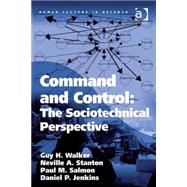Command and Control: The Sociotechnical Perspective
, by Walker,Guy H- ISBN: 9780754672654 | 0754672654
- Cover: Hardcover
- Copyright: 12/28/2009
Organisations and technology are said to be co-evolving; technology creates new opportunities for different 'types' of organisations just as new types of organisations place new demands on technology. Sociotechnical theory, although something of a buzzword in Human Factors, is in actual fact a set of robust principles, concepts and theories that helps to ensure the joint optimisation of organisations (the socio) and technology (the technical). The concept of Network Enabled Capability (NEC) stands as today's apogee of techno-organisational co-evolution. It is more than just its technological parts, which are motivated by distributed technology like the internet, it is also about the type of organisation that can best exploit the new capabilities afforded by networked technology, such as peer-to-peer interaction.This book fills an important gap in the incipient state of NEC's development, as a specific case, but also advances the state of the art in terms of thinking about jointly optimising the 'socio' and 'technical' of any organisation; after all, command and control, and concepts like NEC, are by no means unique to the military. It touches on several topics of current interest within Human Factors, including how to cope with, and actively exploit, the promises and pitfalls of complexity, how to set the initial conditions from which the vision of NEC (synchronisation, shared awareness, etc) can emerge and advancing the case for shifting the critical unit of analysis in Human Factors from the individual user/device/interface to the level of an entire system/its technology/its complex emergent properties.The central thread of the book is how to use sociotechnical theory to move organisations away from notions of very traditional, bureaucratic, hierarchical command and control to the sort of 'Edge Organisations' now being spoken of as representing the vision of NEC. The 'how to' aspect of the work is a prominent feature, as it brings a set of sometimes abstract (but no less useful) principles down to the level of easy examples, design principles, evaluation criteria and practical interventions. All of these are based on an extensive review of the current state of the art as well as through new sociotechnical/NEC studies conducted by the authors.







